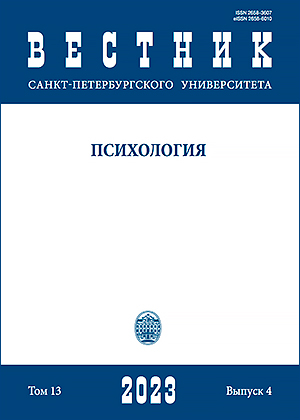Контекстуальный подход к описанию характеристик темперамента дошкольника: роль образовательной среды
DOI:
https://doi.org/10.21638/spbu16.2023.403Аннотация
Развитие свойств темперамента, согласно современным исследованиям, зависит не только от созревания структур нервной системы, но и от ряда параметров среды. В частности, установлено, что отношение родителей как показатель социальной среды, а также характеристики физической среды могут влиять на проявление темпераментальных особенностей ребенка. Свойства темперамента начинают играть особенно важную роль в процессе социализации, когда ребенок попадает из семейной среды в образовательную, качество которой является значимым фактором дальнейшего развития дошкольников. В связи с этим важно установить, есть ли связь между свойствами темперамента и характеристиками образовательной среды (структурными и процессуальными). Согласно проведенному анализу, большинство реализованных исследований рассматривает связи процессуальных характеристик образовательной среды с особенностями темперамента ребенка, то есть с особенностями взаимодействия и отношений между ребенком и педагогом; влияние отношения педагога к ребенку на проявление свойств темперамента; связи свойств темперамента ребенка с качеством отношений с педагогом. Структурные характеристики образовательной среды также демонстрируют связь с темпераментом ребенка, однако результаты изучения этой связи получены достаточно давно и значительно ограничены, что актуализирует вопрос о необходимости исследований в данном направлении. В обзоре обсуждаются особенности интерпретации связи темперамента с параметрами образовательной среды с учетом ее интерактивности (М.Ротбарт), критерия соответствия (А.Томас, С.Чесс), феномена выбора ниши (С.Скарр, К.Маккарти), гипотезы дифференциальной восприимчивости (Б.Эллис) и сензитивных периодов развития свойств темперамента. Обсуждаются возможности учета темперамента детей в процессе реализации образовательных программ дошкольных учреждений.
Ключевые слова:
темперамент, дошкольный возраст, структурные характеристики образовательной среды, процессуальные характеристики образовательной среды
Скачивания
Библиографические ссылки
References
Загрузки
Опубликован
Как цитировать
Выпуск
Раздел
Лицензия
Статьи журнала «Вестник Санкт-Петербургского университета. Психология» находятся в открытом доступе и распространяются в соответствии с условиями Лицензионного Договора с Санкт-Петербургским государственным университетом, который бесплатно предоставляет авторам неограниченное распространение и самостоятельное архивирование.




